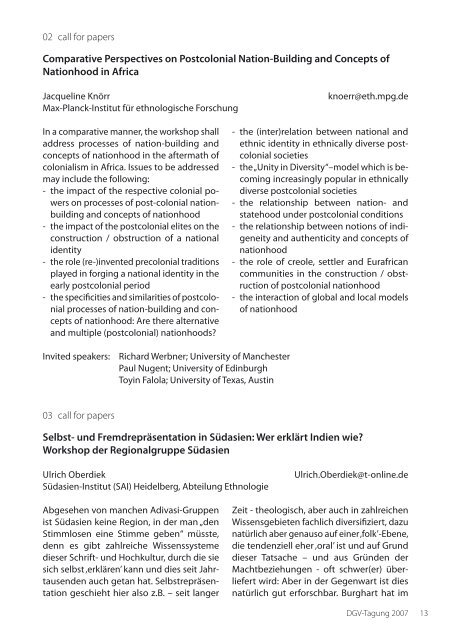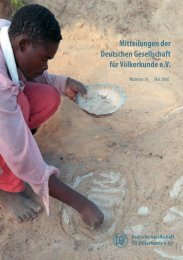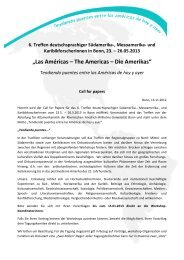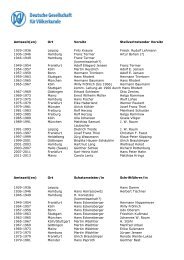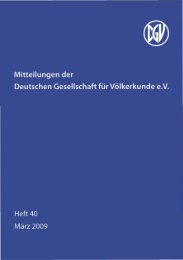DGV-Tagung 2007 - Deutsche Gesellschaft für Völkerkunde
DGV-Tagung 2007 - Deutsche Gesellschaft für Völkerkunde
DGV-Tagung 2007 - Deutsche Gesellschaft für Völkerkunde
- Keine Tags gefunden...
Erfolgreiche ePaper selbst erstellen
Machen Sie aus Ihren PDF Publikationen ein blätterbares Flipbook mit unserer einzigartigen Google optimierten e-Paper Software.
02 call for papersComparative Perspectives on Postcolonial Nation-Building and Concepts ofNationhood in AfricaJacqueline KnörrMax-Planck-Institut für ethnologische Forschungknoerr@eth.mpg.deIn a comparative manner, the workshop shalladdress processes of nation-building andconcepts of nationhood in the aftermath ofcolonialism in Africa. Issues to be addressedmay include the following:- the impact of the respective colonial powerson processes of post-colonial nationbuildingand concepts of nationhood- the impact of the postcolonial elites on theconstruction / obstruction of a nationalidentity- the role (re-)invented precolonial traditionsplayed in forging a national identity in theearly postcolonial period- the specificities and similarities of postcolonialprocesses of nation-building and conceptsof nationhood: Are there alternativeand multiple (postcolonial) nationhoods?- the (inter)relation between national andethnic identity in ethnically diverse postcolonialsocieties- the „Unity in Diversity“–model which is becomingincreasingly popular in ethnicallydiverse postcolonial societies- the relationship between nation- andstatehood under postcolonial conditions- the relationship between notions of indigeneityand authenticity and concepts ofnationhood- the role of creole, settler and Eurafricancommunities in the construction / obstructionof postcolonial nationhood- the interaction of global and local modelsof nationhoodInvited speakers:Richard Werbner; University of ManchesterPaul Nugent; University of EdinburghToyin Falola; University of Texas, Austin03 call for papersSelbst- und Fremdrepräsentation in Südasien: Wer erklärt Indien wie?Workshop der Regionalgruppe SüdasienUlrich OberdiekSüdasien-Institut (SAI) Heidelberg, Abteilung EthnologieUlrich.Oberdiek@t-online.deAbgesehen von manchen Adivasi-Gruppenist Südasien keine Region, in der man „denStimmlosen eine Stimme geben“ müsste,denn es gibt zahlreiche Wissenssystemedieser Schrift- und Hochkultur, durch die siesich selbst ‚erklären’ kann und dies seit Jahrtausendenauch getan hat. Selbstrepräsentationgeschieht hier also z.B. – seit langerZeit - theologisch, aber auch in zahlreichenWissensgebieten fachlich diversifiziert, dazunatürlich aber genauso auf einer ‚folk’-Ebene,die tendenziell eher ‚oral’ ist und auf Grunddieser Tatsache – und aus Gründen derMachtbeziehungen - oft schwer(er) überliefertwird: Aber in der Gegenwart ist diesnatürlich gut erforschbar. Burghart hat im<strong>DGV</strong>-<strong>Tagung</strong> <strong>2007</strong> 13


